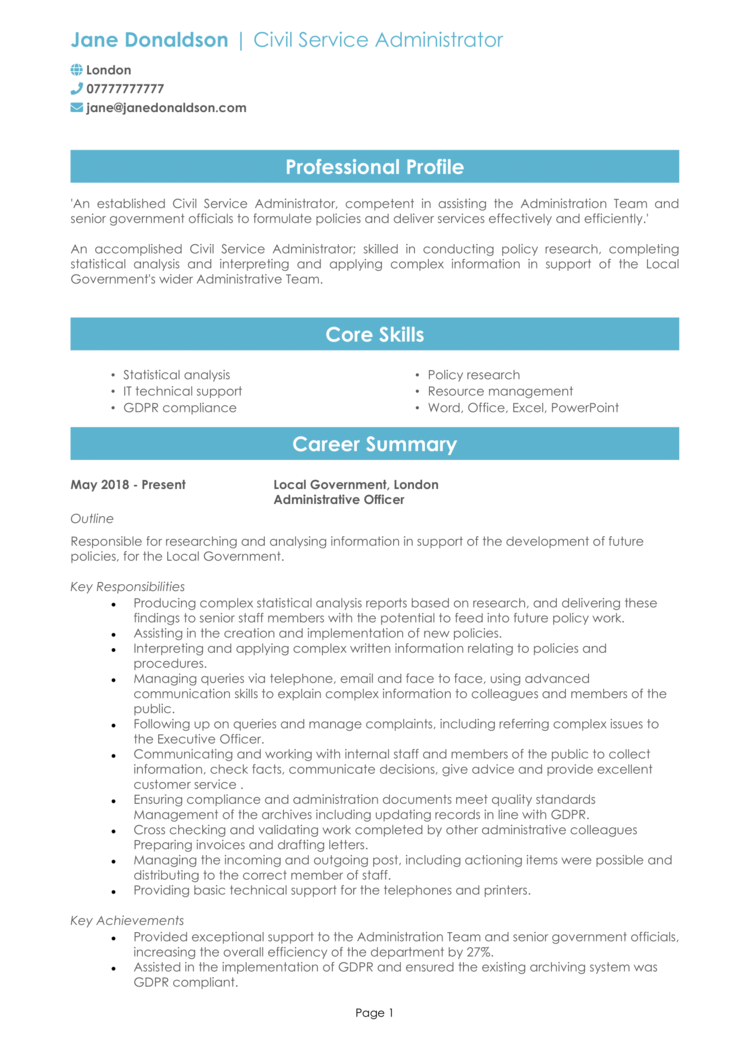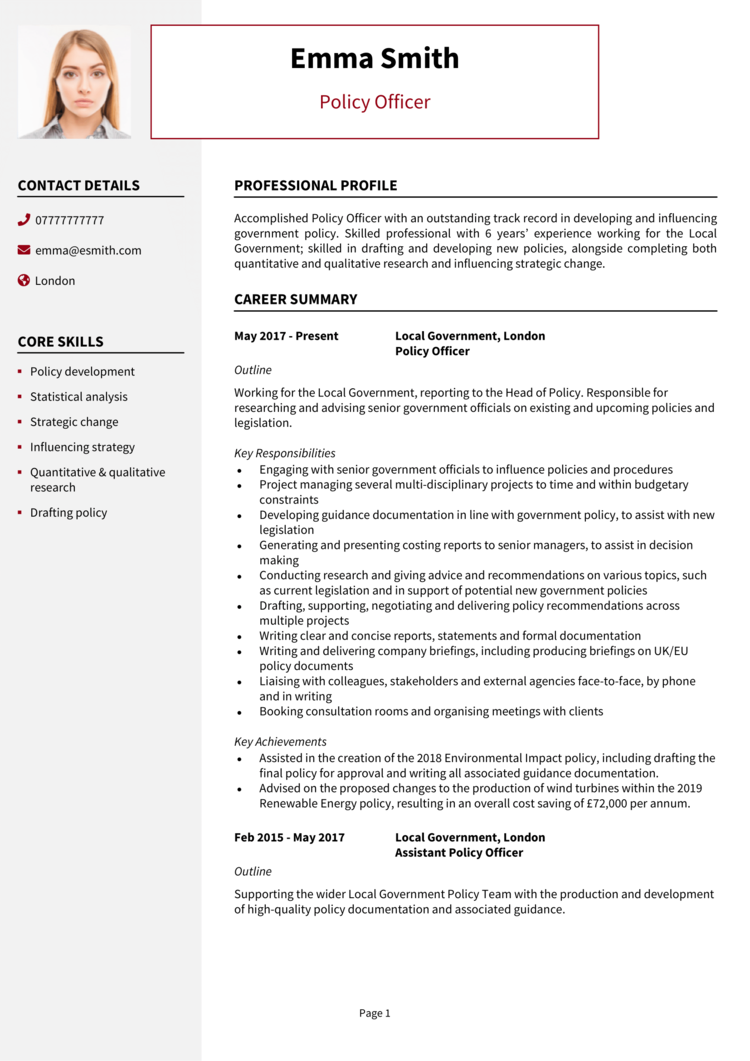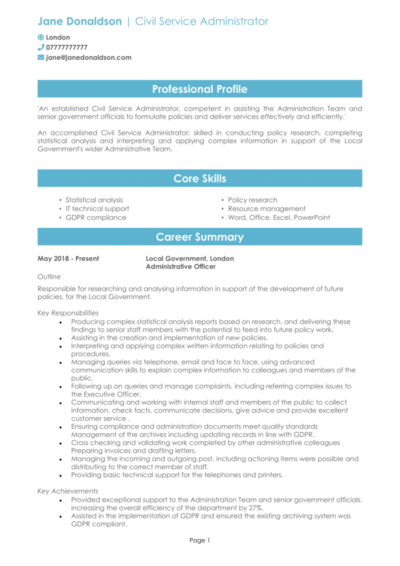A career in the Civil Service is about making a difference, whether you’re managing budgets, drafting policies, or ensuring vital services run smoothly.
But before you start making an impact in government… First, let’s get your CV in shape.
This guide, complete with two Civil Service CV examples, will help you craft a CV that demonstrates your skills, experience, and make a big impression on civil hiring mangers.
Civil Service Administrator CV

Policy Officer CV example

How to write your Civil Service CV
Learn how to create your own interview-winning Civil Service CV with this simple step-by-step guide.
Writing a Civil Service CV means presenting your skills and experience in a way that shows you’re not just qualified but also committed to serving the public good. Recruiters want to see evidence of your analytical skills, leadership, and ability to work within complex structures.
This guide will show you how to highlight your expertise, writing your application with the Civil Service competency framework in mind, to help you stand out as the ideal candidate.
Civil Service CV structure


Your CV should be as structured as a good government report – clear, concise, and full of important information (but maybe with fewer appendices). Recruiters need to see your skills, qualifications, and achievements without wading through a bureaucratic mess.
Here’s how to structure your Civil Service CV:
- Name and contact details – Clearly display these details at the top to make it easy for potential employers to contact you. A photo is optional, but rarely necessary for Civil Service roles.
- Profile – Craft a short introduction that showcases your professional background and key accomplishments.
- Core skills – List off your strongest skills, such as policy analysis, stakeholder management, that align with the role’s requirements.
- Work experience – Walk through your employment history starting from the most recent things: focus on measurable results and responsibilities.
- Education – Mention the academic history which underpins your expertise: qualifications, professional certifications, and relevant training.
- Additional info – This optional section could include hobbies and interests that showcase leadership, analytical skills, or community involvement.
The correct format for a Civil Service CV


A poor format is like bad public transport – confusing, frustrating, and not going to get you where you want to be. Even the most qualified candidates can lose out if their CV makes the mistake of a bad presentation.
Here’s how to format your Civil Service CV:
- Bullet points – Keep sentences concise and impactful, using bullet points to organise responsibilities.
- Divide sections – Make use of distinct headings and logical spacing to guide recruiters through each important section of your CV.
- Use a clean font – Stick with a clean, clear font to make your CV polished and easy to read.
- Keep it the right length – Keep it concise to maintain their interest while still covering all the essentials. It should be no longer than 2 pages.
Civil Service CV profile


Your profile is your elevator pitch – show them you’re the person who can streamline operations and make red tape look manageable. It’s your chance to demonstrate your skills and passion for public service.
Civil Service CV profile examples
Profile 1
Organised Civil Service Officer with five years of experience in policy development and public administration. Skilled in drafting reports, analysing data, and implementing government initiatives to improve community services. Proficient in managing stakeholder relations and maintaining compliance with regulatory standards.
Profile 2
Dedicated Civil Service Administrator with three years of experience supporting operational teams within local government. Adept at coordinating projects, preparing documentation, and handling public inquiries with professionalism and discretion. Experienced in using database systems and MS Office Suite for efficient record management.
Profile 3
Experienced Civil Service Manager with over eight years in central government, specialising in programme management and policy implementation. Skilled in delivering large-scale initiatives, managing budgets, and collaborating with cross-departmental teams to achieve strategic objectives.
What to include in your Civil Service CV profile
Here are some tips on what to include in your Civil Service CV profile:
- Where you’ve worked – Mention previous roles, particularly in public sector organisations or related fields.
- Your top qualifications – Highlight degrees or certifications in areas like public administration, policy analysis, or law.
- Key skills – Include competencies like strategic thinking, policy development, and communication.
- Stakeholders you’ve worked with – Reference your experience collaborating with government bodies, communities, or private organisations.
- Achievements – Mention key accomplishments, such as implementing successful policies or managing impactful projects.
How to present your core skills section properly


Your core skills section is like a public service announcement – short, clear, and packed with vital information. Give recruiters a quick overview of your abilities and how they align with the Civil Service competency framework.
For Civil Service roles, this section should focus on analytical skills, project management, and stakeholder engagement. Tailor this section like you’d tailor a policy proposal: relevant and convincing enough to get funding approved.
Top skills for your Civil Service CV
- Policy Analysis – Evaluating the effectiveness of policies and proposing improvements.
- Stakeholder Engagement – Building relationships with government agencies, community leaders, and other key players.
- Project Management – Leading initiatives from planning to execution while ensuring timely delivery.
- Strategic Thinking – Developing long-term plans to address public needs and organisational goals.
- Data Analysis – Interpreting statistics and research to inform decision-making.
- Budget Management – Allocating resources effectively to maximise public value.
- Team Leadership – Guiding cross-functional teams to achieve departmental objectives.
- Public Speaking – Delivering presentations and reports to senior officials or the public.
- Compliance and Regulation – Ensuring adherence to laws and policies in project implementation.
- Crisis Management – Responding effectively to unexpected challenges and emergencies.
How to write a strong work experience section for your CV


Your work experience section is where you demonstrate your ability to handle the responsibilities of a Civil Service role. Highlight your contributions to public projects, policy development, and organisational improvements.
List your roles in reverse chronological order, focusing on responsibilities and measurable outcomes.
The best way to structure job entries on your CV

- Outline – Provide an overview of the organisation, your role, and the department you worked in.
- Responsibilities – Highlight tasks like drafting policies, managing projects, or analysing data. Use action verbs like “developed,” “implemented,” or “coordinated.”
- Achievements – Showcase measurable results, such as improved policy outcomes, successful project completion, or stakeholder satisfaction. Include figures wherever possible to strengthen your impact.
Example jobs for Civil Service
Policy Officer | Department for Social Development
Outline
Developed and implemented policies to support community welfare programmes, ensuring alignment with government objectives and stakeholder expectations. Focused on improving service delivery and efficiency.
Responsibilities
- Researched and analysed data to inform the development of public policies.
- Drafted detailed reports and recommendations for senior officials.
- Collaborated with stakeholders to ensure successful implementation of welfare initiatives.
- Monitored programme outcomes and provided insights for continuous improvement.
- Ensured compliance with legislative and regulatory requirements in all activities.
Achievements
- Delivered a policy framework that improved access to community services by 25 percent.
- Reduced administrative costs by 15 percent through process optimisation.
- Recognised for producing a comprehensive report adopted as a national standard.
Operations Assistant | Local Government Operations
Outline
Provided administrative and operational support for local council services, ensuring smooth execution of community programmes and efficient public engagement. Focused on process improvement and stakeholder management.
Responsibilities
- Coordinated schedules and logistics for council meetings and public consultations.
- Prepared and maintained accurate records of council activities and decisions.
- Responded to public inquiries, providing clear and accurate information.
- Managed the procurement of resources and services in compliance with council policies.
- Assisted in drafting and distributing communication materials for local initiatives.
Achievements
- Improved response times to public inquiries by 20 percent through workflow enhancements.
- Streamlined record-keeping systems, reducing errors by 30 percent.
- Successfully organised a community consultation event attended by over 500 residents.
Civil Service Administrator | Ministry of Infrastructure
Outline
Managed large-scale infrastructure projects for a central government department, ensuring effective planning and execution. Delivered programmes that enhanced public services and improved urban development.
Responsibilities
- Oversaw project budgets, schedules, and resource allocation to meet objectives.
- Facilitated cross-departmental collaboration to ensure alignment with national policies.
- Conducted risk assessments and implemented mitigation strategies for key projects.
- Monitored project progress and prepared reports for senior officials.
- Liaised with external contractors to ensure quality and timely delivery of projects.
Achievements
- Delivered a £20M infrastructure project six weeks ahead of schedule and under budget.
- Reduced project risks by 25 percent through enhanced planning and monitoring.
- Received commendation for implementing innovative strategies in urban development.
Education section


The education section is essential for Civil Service roles, as it demonstrates your foundational knowledge and analytical capabilities. Include degrees, certifications, and any relevant professional development courses.
List your qualifications in reverse chronological order, starting with the most recent.
Qualifications recruiters look for in Civil Service candidates
- Bachelor’s Degree in Public Administration or Political Science – Foundational knowledge of governance and policy-making.
- Master’s Degree in Public Policy or Law – Advanced expertise in legislative and regulatory frameworks.
- Project Management Professional (PMP) Certification – Skills in managing complex initiatives.
- Data Analytics Certification – Proficiency in interpreting data to inform policy decisions.
- Diploma in Strategic Leadership and Management – Training in guiding teams and organisations toward strategic goals.





